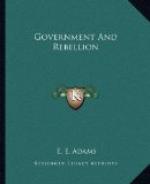of God: and they that resist shall receive to
themselves damnation.” Despisers of government
are enumerated by the Apostle as among the most flagitious
of men. There are statutes in almost every
government which may not be absolutely right; some
which may be oppressive. These are to be distinguished
from the principles, from the general bearing of a
government, and endured for the good therein, or be
rid of by constitutional and safe methods. It
is a duty of each subject and citizen to surrender
some of his desires and preferences—some
of his convictions possibly—for the general
sentiment—the comprehensive good; while
he has the privilege of convincing by fair argument
all others, and winning them to his views and measures
if possible, without violence, without infringement
of law. It is not to be expected that every man
should be absolutely satisfied with any government.
If he is called to yield only his share of personal
interest and preference, for the sake of all the protection
and blessing in which he participates in common with
the state, his reason, his conscience, his patriotism
will joyfully acquiesce; he will freely make so much
sacrifice for the interests of the whole, knowing very
well that every other citizen is likely to be under
an equal sacrifice. Natural, individual liberty,
without law, is only barbarism. Where every man
is free to do whatever his worst passions prompt, there
is in fact no freedom; there is tyranny; for the strong
will subdue the weak, bone and muscle will govern
mind and conscience. In laws and governments men
have their best thoughts; human law is likely
to be better than human nature. Men feel the
need of restraint—are convinced of the necessity
of law. They therefore make laws in self-defence;
if thereby they would not restrain their own
selfishness, they would restrain the selfishness
of others; but that which is made a barrier to one
bad subject is also a defence against all;—thus
men do restrain themselves by their defences against
others. Thus it is that, with healthful convictions,
men may control diseased passion; with a right ideal
is intimately joined a safe actuality; with good law,
a comparatively good condition. Even in the worst
administration, and when the public mind is most demoralized,
there may remain the purity of law; the sublime thought.
If the mind finds itself sinking into lawlessness and
disorganism, and borne away by the pressure of evil,
it can look upward, and, catching new energy from
the unquenched light—
“Spring into the realm of the ideal.”
Our destiny is ideal. We are on our way to the Unseen. The ideal draws us upward,—real now, to the spirits of just men made perfect—to be real to us when we are perfect—once ideal to them, as now to us. We must keep above us the model of life and of law which we have not yet attained. Let it never be dim. It is a star shining through time’s night! A banner waving from the throne of God. It tells us of the goal. It points out our futurity—the altitude of our virtue, our exaltation, our bliss.




